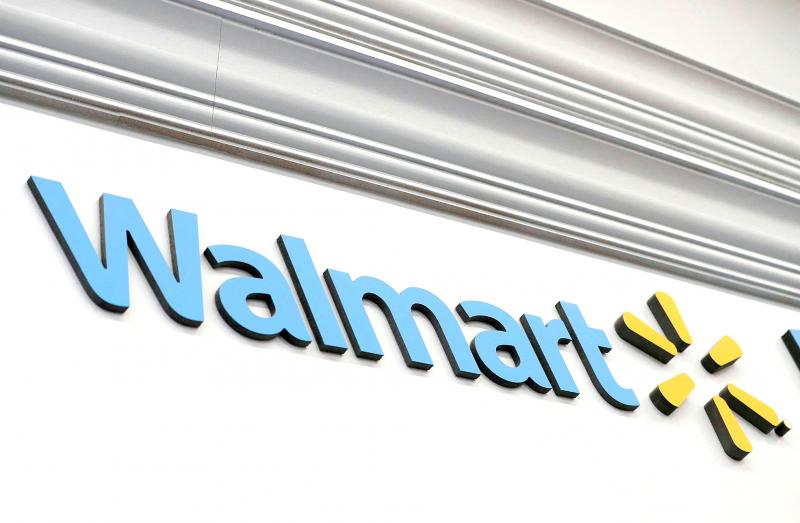Walmart Inc is preparing to create its own cryptocurrency and collection of non-fungible tokens (NFTs), filings with the US Patent and Trademark Office show, setting the stage for meeting its customers in the emerging metaverse.
The retailer last month sought several new trademarks that show it intends to make and sell virtual goods such as electronics, decor, toys, sporting goods and personal care products.
The applications, which were first reported by CNBC, represent a significant step for the retail giant as it studies how to participate in the metaverse, a virtual world that blends aspects of digital technologies.

Photo: Reuters
Walmart in August last year advertised a position to develop the “digital currency strategy and product roadmap,” while identifying “crypto-related investment and partnerships,” a job posting on the company’s Web site said.
The applications were among a flurry that the company filed on Dec. 30, including three under “Walmart Connect” — the name of the company’s existing digital advertising venture — for a financial exchange for virtual currency and advertising.
Applications also were filed for “Verse to Store,” “Verse to Curb” and “Verse to Home” for shopping services.
It is also seeking trademarks to apply the Walmart name and “fireworks” logo to healthcare services and education in virtual and augmented reality.
“Walmart is continuously exploring how emerging technologies may shape future shopping experiences,” the company responded in an e-mailed statement. “We don’t have anything further to share today, but it’s worth noting we routinely file trademark applications as part of the innovation process.”
All of the applications were filed indicating that the company intends to use them, but has not yet begun doing so.
The trademarks would not be registered until they are in actual use.
The company’s cryptocurrency plans were the subject of a high-profile hoax in September last year, when a fake announcement caused a short-lived surge in litecoin, a relatively obscure cryptocurrency.
The fabricated news release said that Walmart would start letting its customers pay with litecoin.
In October, the Arkansas-based retailer started a pilot program in which shoppers can buy bitcoin at Coinstar kiosks in some of its stores.
The test with Coinstar, which is known for the machines that let customers exchange US coins for paper bills or gift cards, includes 200 kiosks in Walmart stores.
Early last month, Walmart chief financial officer Brett Biggs told an analyst conference that the company was open to allowing shoppers to pay in cryptocurrency if customers demand it, but the company did not see a need to rush out any capabilities.

Semiconductor shares in China surged yesterday after Reuters reported the US had ordered chipmaking giant Taiwan Semiconductor Manufacturing Co (TSMC, 台積電) to halt shipments of advanced chips to Chinese customers, which investors believe could accelerate Beijing’s self-reliance efforts. TSMC yesterday started to suspend shipments of certain sophisticated chips to some Chinese clients after receiving a letter from the US Department of Commerce imposing export restrictions on those products, Reuters reported on Sunday, citing an unnamed source. The US imposed export restrictions on TSMC’s 7-nanometer or more advanced designs, Reuters reported. Investors figured that would encourage authorities to support China’s industry and bought shares

FLEXIBLE: Taiwan can develop its own ground station equipment, and has highly competitive manufacturers and suppliers with diversified production, the MOEA said The Ministry of Economic Affairs (MOEA) yesterday disputed reports that suppliers to US-based Space Exploration Technologies Corp (SpaceX) had been asked to move production out of Taiwan. Reuters had reported on Tuesday last week that Elon Musk-owned SpaceX had asked their manufacturers to produce outside of Taiwan given geopolitical risks and that at least one Taiwanese supplier had been pushed to relocate production to Vietnam. SpaceX’s requests place a renewed focus on the contentious relationship Musk has had with Taiwan, especially after he said last year that Taiwan is an “integral part” of China, sparking sharp criticism from Taiwanese authorities. The ministry said

US President Joe Biden’s administration is racing to complete CHIPS and Science Act agreements with companies such as Intel Corp and Samsung Electronics Co, aiming to shore up one of its signature initiatives before US president-elect Donald Trump enters the White House. The US Department of Commerce has allocated more than 90 percent of the US$39 billion in grants under the act, a landmark law enacted in 2022 designed to rebuild the domestic chip industry. However, the agency has only announced one binding agreement so far. The next two months would prove critical for more than 20 companies still in the process

CHANGING JAPAN: Nvidia-powered AI services over cellular networks ‘will result in an artificial intelligence grid that runs across Japan,’ Nvidia’s Jensen Huang said Softbank Group Corp would be the first to build a supercomputer with chips using Nvidia Corp’s new Blackwell design, a demonstration of the Japanese company’s ambitions to catch up on artificial intelligence (AI). The group’s telecom unit, Softbank Corp, plans to build Japan’s most powerful AI supercomputer to support local services, it said. That computer would be based on Nvidia’s DGX B200 product, which combines computer processors with so-called AI accelerator chips. A follow-up effort will feature Grace Blackwell, a more advanced version, the company said. The announcement indicates that Softbank Group, which until early 2019 owned 4.9 percent of Nvidia, has secured a